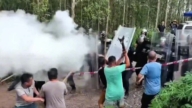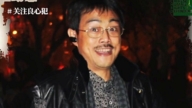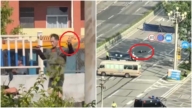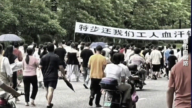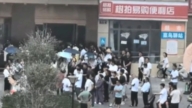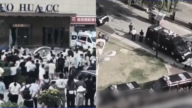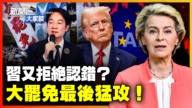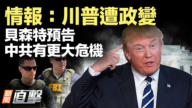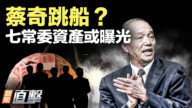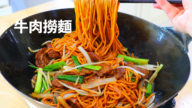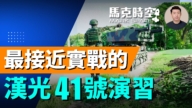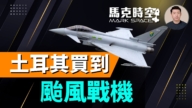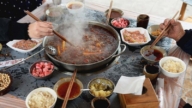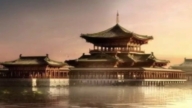【新唐人2014年06月07日讯】1989年六四,军队开枪镇压学生、平民已经成为一页沉痛的历史。日前,香港《苹果日报》旗下的《壹周刊》报导,美国政府获得中南海内部文件,评估“六四”屠杀事件,死伤民众多达40,000人,其中10,454人被杀。但是据知情人透露,当时面对朝人民开枪的历史罪责,中共军队和高层的许多人有过抵制,就连中共最高领导人也始终不敢直接说出“开枪”的命令。
第38集团军担任军长的徐勤先少将,是一个不服从“六四”镇压命令的例子。徐勤先认为,军队的训练目地是抵御外敌入侵。他担忧,动用军队镇压抗议民众会产生恶劣的后果。他在接到命令之后,拒绝带领部队进京。
据大陆《炎黄春秋》杂志副社长杨继绳的采访,徐勤先对上级说,“宁杀头,不做历史罪人。”他也因此被立即逮捕。
而另外一名叫王东的师长,也曾经在军队高层发起请愿,呼吁领导层退兵。有七名军官参与联署。据美国《纽约时报》6月3号报导,王东的请愿书中写道,“人民军队是属于人民的军队,不能同人民对立,更不能杀死人民。”
“六四”学生领袖王军涛在6月3号接受《新唐人》采访时说,王东的这个请愿行动实际上是他的上级授意的。王东是中共军队上将,当时出任中央军委副秘书长洪学智的秘书。
六四学生领袖王军涛:“洪学智反对镇压,但是他也知道军令如山,所以他叫王东制造了一个情况。”
据《纽约时报》报导,王东跟学生领袖王军涛和周舵举行了秘密会议,这两名自由主义知识份子,当时设法阻止军队发起攻击。
王军涛对《新唐人》表示,他们其实阻止不了邓小平的决策,王东只是告诉他们,军队进城的计划是什么,军队的预案是什么。
王军涛:“军队的预案没有那么严重,没有说打死市民的暴力等级。军队的暴力预案就是说,从监狱里搞几个死刑犯,然后他们开枪把他们击毙。老百姓看到死人之后就会散开。但是八九年实际上超过了(预订方案)。”
参加天安门抗议的香港学生李兰菊,向美国国会作证的证词说,“在六‧四清晨,恐怖的军方信号弹在天安门的上空发射,很快从远方听到连串的枪声。”“一些受伤严重的学生从大楼后面的树丛被抬到附近的救护站,其中一人看起来是一位大学生,他的后脖被打得血肉模糊,下半身已经动不了了。”
《纽约时报》报导,中共军队里没有人愿意承担向平民开火的直接责任。王军涛对《新唐人》表示,中共最高领导人和军队高层,没有任何人敢说出“开枪”二字。
王军涛:“八九年这个事邓小平肯定是罪魁祸首,但是这件事情,开枪本身到现在为止,我还没有找到一个开枪令。戒严部队指挥部给各部队的命令是,不惜一切代价,采取一切手段,在指定时间到达指定地点。那后来各个戒严部队在挺进时就问,是不是可以开枪?他们没有说。还是这么说,意思说可以开枪,但是他们不想用这个词。”
在戒严部队当中,还有一位师长以消极怠工的方式抵制镇压命令。据39军雷达兵李晓明向《纽约时报》回忆说,他所在的116师的师长许峰,没有理会向天安门广场进发的命令。许峰在得知军队展开血腥镇压后,在冲突较为缓和的东郊按兵不动,还假装军中的无线电通讯出了故障。李晓明至今仍然记得电台里传来疯狂的呼叫。
在“六四”天安门流血镇压发生之后,中共高层面对全国人民的愤怒和全世界的谴责,也感到慌乱。王军涛透露,当时中央军委两派发生争论,一派怪另一派开枪把形势搞糟了。
“六四镇压”的决策者们都害怕被钉在历史的耻辱柱上。李鹏四年前撰写的《六四日记》,揭发中共元老邓小平杀气腾腾的多次讲到“不怕流血”、“打压”、“快刀斩”,来暗示邓小平是开枪杀人的罪魁祸首,李鹏试图为自己洗白。
而“六四镇压”最高级别的抗命者—-时任总书记的赵紫阳,随后被囚终身。
采访编辑/秦雪后制/肖颜
Some Military Were Against The Repression of The
Students on June 4.
June 4, 1989 was a bitter day in history when the Chinese
Communist Party (CCP) military opened fire on students
and civilians.
An inside document from Zhongnanhai, the CCP’s central
office leaked to the U.S. government reveals that over 40,000
people were injured or died, and 10,454 people were killed
according to a recent report from Honk Kong’s Next Media..
Inside sources revealed that many high level officers
in the military were against the firing at the time.
Even the top leader back then didn’t dare to say
“open fire” directly in the order.
Xu Qinxian, major-general of the 38th Army, was an example
of those who opposed the repression of the June 4 protests.
Xu believed that the military was trained to
fight against foreign invasion.
He was afraid that using the military to repress protesting
civilians would lead to severe consequence.
He refused to lead his army to Beijing
when he received the order.
Yang Jisheng, Vice Principal of Chinese magazine Yanhuang
Chunqiu, Xu responded to the higher level, saying “I’d rather
be beheaded than be a criminal in the eyes of history.”
Xu was immediately arrested for that.
Wang Dong, a division commander in the military, also
appealed to the leadership level to withdraw the army.
Seven military officers signed a joint petition.
According to NYT on June 3 Wang Dong’s petition said:,
“The people’s military belongs to the people, and cannot
oppose the people. Even less can it kill the people.”
Wang Dong’s petition action was actually instructed
by his boss, said June 4 student leader Wang Juntao
in an interview with NTD on June 3.
Wang Dong was a general in the CCP military, the assistant
to Hong Xuezhi, deputy secretary of the Central Military.
Wang Juntao, June 4 student leader: “Hong Xuezhi was
against the repression, but he knew that an military order
is irrevocable. So he asked Wang Dong to petition.”
Wang Dong had a secret meeting with student leaders Wang
Juntao and Zhou Tuo who were liberal intellectuals,attempting
to stop the military from launching an attack, reported NYT.
Wang Juntao told NTD that they weren’t be able to stop
the leader Deng Xiaoping’s decision, but Wang Dong
just wanted to let them know what the military’s plan was.
Wang Juntao: “The military plan wasn’t that severe.
It didn’t mention killing civilians.
The violent military plan was to get some prisoners from the
jails and then to shoot them to death.
When people saw them being killed, they would leave. But
in fact, the [June 4] incident in 1989 was beyond the plan.”
Li Lanju, a Hong Kong student in the protest at Tiananmen,
gave testimony to the U.S. Congress, saying “On the morning
of June 4, a horrible military signal flare was emitted above
Tiananmen Square.
Soon, I heard a series of gunshots from far away…
Some severely injured students were carried to nearby
rescue stations.
One of the injured men seemed to be a college student. His
neck was badly mutilated,and his lower body couldn’t move.”
The NYT report says no one in the CCP military wants to
take direct responsibility for opening fire on civilians.
Wang Juntao told NTD that no one in the leadership level
and in the military high level dared to mention “open fire.”
Wang Juntao: “Deng Xiaoping is definitely the culprit of
the June 4 incident.
But I haven’t found any order of opening fire in this incident.
The headquarters of the martial law troops gave all army
groups an order that was to arrive at the designated place
at the designated time at all costs and by all means.
Then, all army groups asked if they could open fire while
marching.
The headquarter didn’t answer, and repeated the
same order, which means that they allowed shooting,
but they didn’t want to use that word.”
There was another commander who protested against
the order by slacking his work in the military.
Li Xiaoming, a radar soldier in the 39th Army told the NYT
that his commander Xu Feng in the 116th division didn’t
follow the order of marching to Tiananmen Square.
After Xu received the order, he let the army stay at the eastern
suburb of Beijing, and pretended that the wireless radio broke.
Li Xiaoming still remembers the crazy yells from the radio.
After the bloody repression on June 4 at Tiananmen, the CCP
high level was also flustered under the condemnation of the
people in China and the whole world.
Wang Juntao reveals that two factions in the Central Military
Commission had an argument, with one faction blaming the
other faction for opening fire and messing up the situation.
Decision makers of the June 4 repression were all afraid
of being named and disgraced in history.
Former Chinese premier Li Peng published a June 4 Diary
four years ago, revealing that Deng Xiaoping said “no fear
of bleeding,” “crackdown,” and “cut with sharp knife” often
hinting that Deng is the culprit of the opening fire.
Li Peng attempted to whitewash himself this way.
The highest official opposed the June 4 repression was
Zhao Ziyang, then the general secretary of the CCP.
Zhao was under house arrest after the incident until he died.



